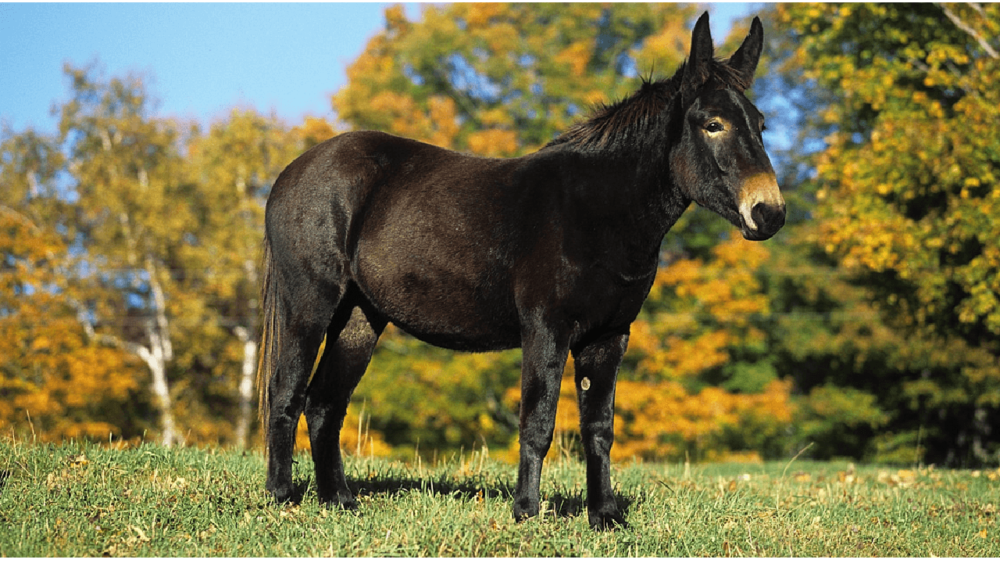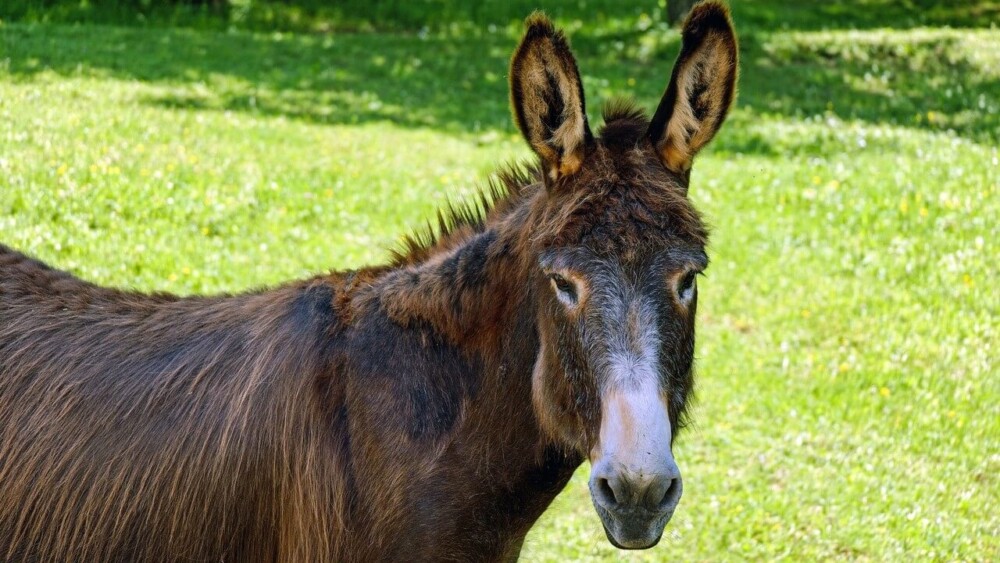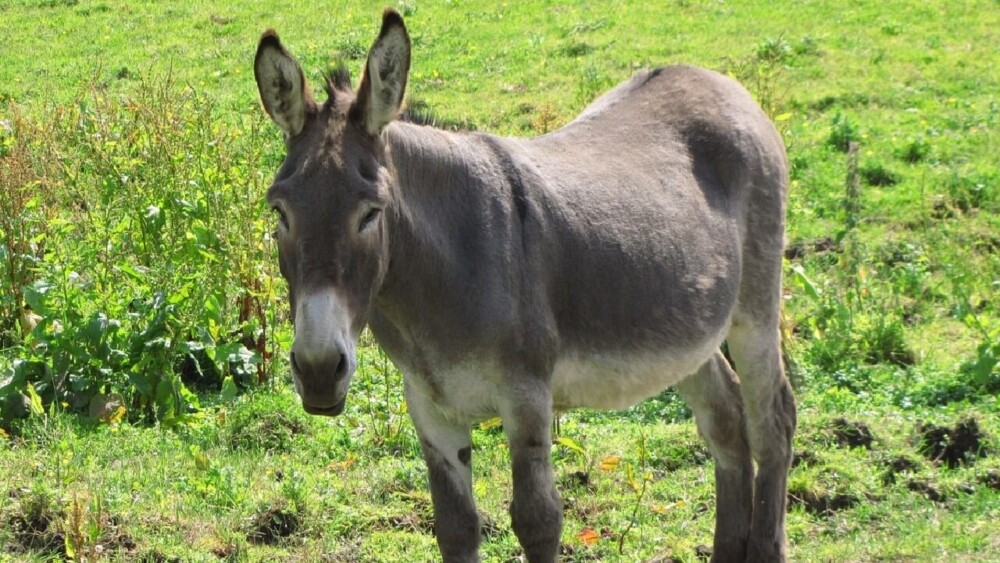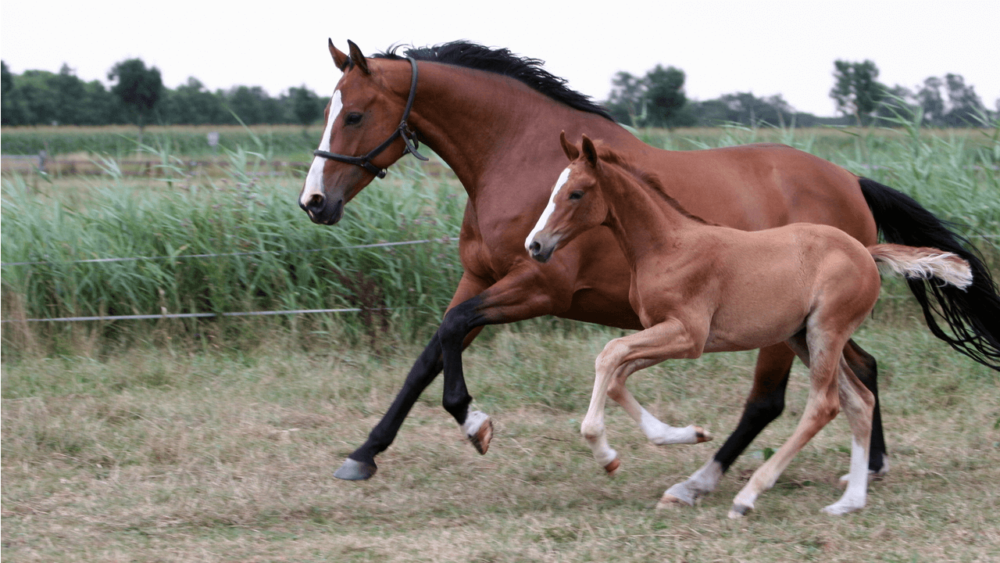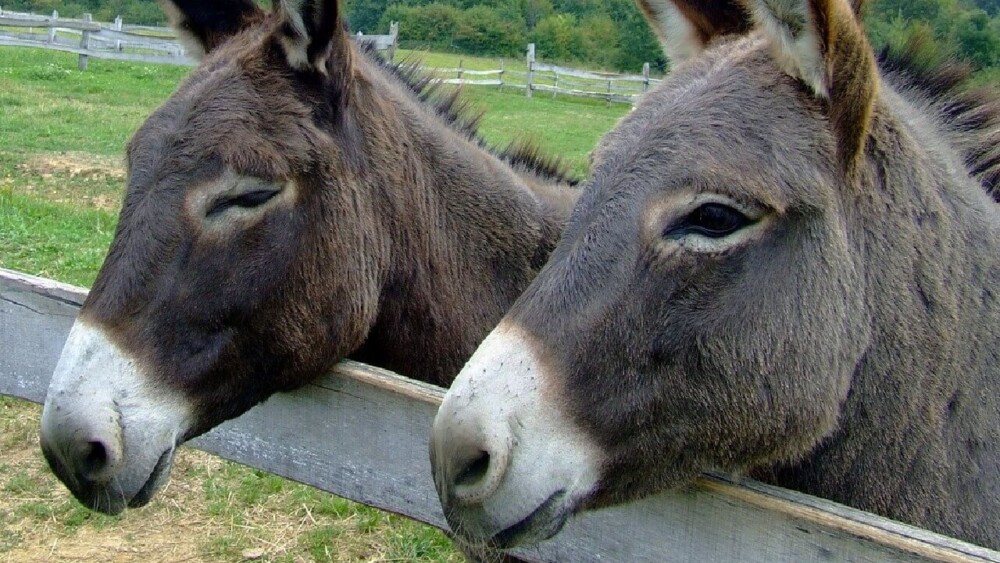One of my friends mentioned that since horses and donkeys are very similar, they should be considered the same species. It’s an interesting thought and one I wanted to clarify.
Why are horses and donkeys different species? The scientific definition of a species is whether or not two animals can interbreed and make offspring also capable of breeding. Horses and donkeys can breed, and the result is a mule. However, mules are considered sterile and incapable of breeding. Thus, donkeys and horses are considered different species as their shared offspring cannot breed.
But, there are many more differences between the two. This article will cover key differences between donkeys and horses that set them apart from the same species.
The Reason Mules Are Considered Infertile
For years people have assumed that donkeys and horses are different breeds from the same subspecies because of their comparable form and similar living habits. But, this is not true.
Horses and donkeys both belong to the Equidae family and sub-family Equus. There are 17 species of odd-toed ungulates (large mammals with hooves). Although they are in the same 2903family, they are more like cousins than twins. Each animal has its own set of genetics and attributes.
While it is true that donkeys and horses share some similarities, both have very different characteristics and mannerisms that make it easy to tell the two apart.
Horses and Donkeys Can Breed But Are Different Species
Horses and donkeys can breed but are considered different species. That’s because, for two animals to be considered the same species, they have to be able to produce fertile offspring. All dogs can genetically reproduce fertile offspring.
However, horses and donkeys have a different number of chromosomes. Horses have 64 chromosomes, and donkeys have 62 chromosomes. Mules have 63, which means that mules have an extra chromosome that doesn’t fit in a pair. When a human is born with an extra chromosome, they have Down Syndrome.
The extra chromosome makes mules unable to reproduce….most of the time.
Some Mules Can Reproduce
Generally, mules are considered sterile. But that’s inaccurate. Sterile usually means that the animal isn’t able to reproduce. And some mules can reproduce. Mules are considered infertile because mules can’t reproduce with other mules. Because they have an odd number of chromosomes, they aren’t able to create offspring.
But over the years, there have been reports of mules reproducing with other mules and horses or donkeys. In 2007, a mule gave birth to another mule in Colorado. Genetic testing confirmed that the mule foal, named Kule Mool, was the offspring of the mule mother (NPR source). Kule Mule’s genome showed cells with 63 chromosomes and cells with 64 chromosomes. He was considered a miracle, but he wasn’t the only one.
In 2001 a mule in China reproduced and in Morocco in 2001. Only 60 cases of mules reproducing have been reported since the mid-1500s.
How do mules reproduce even though they are sterile? Occasionally mule mares do produce an egg with an even number of chromosomes. But, even then, the eggs usually don’t have a half-set that is compatible with another half-set from male sperm. There is no known instance of a mule jack reproducing.
That may be because most mule jacks are castrated and never have the opportunity to attempt reproduction.
So, it’s very rare for mule mares to produce an egg with the correct number of chromosomes and is also compatible with sperm chromosomes. But it happened. And, it has happened before.
Donkey and Horse Offspring
Mules have a donkey father (jack) and a horse mother (mare). Hinnies have a horse father (stallion) and a donkey mother (jenny). Hinnies are usually physically weaker than mules.
Mules usually inherit their higher intelligence, strength, patience, endurance, and surefootedness from their donkey fathers. They inherit their physical beauty, athletic ability, and speed from their horse mother.
Hinnies are much rarer. Stallions aren’t as interested in breeding a donkey jenny, and it takes a little more work for the reproduction to occur. A hinny is slower and less energetic than mules. Hinnies are better than mules in rough terrain because they are more meticulous than mules.
Both the mule and the hinny are stronger, hardier, and have tougher hooves than horses. They require less feed and resist parasites better than horses. A mule and a hinny might exhibit the flight instinct from their horse parent or the freeze instinct from the donkey parent, depending on their individual personality.
- Stallion: Male Horse
- Mare: Female Horse
- Jack: Male Donkey
- Jenny: Female Donkey
- Mule: Offspring of Jack + Mare
- Hinny: Offspring of Stallion + Jenny
Mules Reproducing with Horses and Donkeys
Mules can reproduce with horses or donkeys. Although this doesn’t happen frequently, it is occasionally possible. A Donkule or a Jule refers to the offspring of a donkey father (jack) and a mule mother. This hybrid will carry many of the traits of the donkey.
A hule is a mule with a mule mother and a horse father. This is even rarer because stallions are not as often interested in breeding with donkeys.
- Donkule or Jule: Offspring of Jack + Mule Mare
- A mule in Champion, Nebraska, gave birth twice to a jule after breeding with a jack.
- Hule: Offspring of Stallion + Mule Mare
- Old Beck from Texas A&M was documented in the 1920s
- Chimera: An animal offspring that has genetic material from different species
Even though mules occasionally reproduce, it’s rare enough that horses and donkeys are considered separate species. But, there are other significant differences between horses and donkeys.
Physical Differences Between Horses and Donkeys:
One very distinct difference between horses and donkeys is their ears. Horses are born with ears that are small and oval-shaped. This amplifies sound and makes it easier for them to hear. But donkeys have much larger ears. Their origin as desert animals allows donkeys to dissipate heat in hot climates through their more prominent ears.
When looking closely at their coats, donkeys tend to have more wiry hair that feels stiff to the touch. Donkeys’ coats are also more durable to last all seasons. They don’t shed like horses, who have fine, silk-like fur.
Horse hooves are larger in comparison to donkeys’. Horses are prairie animals. Their hooves evolved to absorb impact and catch longer strides when running away from predators on flat planes. Donkeys don’t need their feet for speed and have developed thick walls around their dense frog. The sole is thicker than a horse’s. Their hooves are perfect for breaking rocks and withstand challenging terrain for long distances.
Horse and donkey tails are different. Donkeys have thick, shorter tails that have tuffs at the base used to swat flies. A horse’s tail sprouts on the hindquarters and flows towards the ground in long strands, the dock coming down just below the buttocks. Horses use their tails to protect the horse’s back legs from freezing temperatures.
Donkeys’ backs are flatter than horses’. Horses have six vertebrae in their spine that cause their withers to sit higher than their back. They have a more natural curve. Donkeys only having about five vertebrae are seen having flatter backs, a design that prevents them from getting what is called swaybacks.
- Donkeys have more prominent, longer ears than horses.
- Donkeys have courses, thicker hair that doesn’t shed, unlike horses who shed their silky coat.
- Donkeys have flatter backs than horses
- Horses have larger hooves than donkeys
Behavioral Differences of Horses and Donkeys
Donkeys are often misjudged as stubborn, hard-headed animals with little to no training ability compared to the strict regime shown in fully trained horses. But, this is not true.
Donkeys have a strong sense of self-preservation and are unwilling to do anything that might seem dangerous or cause pain. Donkeys are one of the only animals that observe situations before deciding on an action. This is a trait very different from horses whose instinct is to flee at the first sign of danger.
Both horses and donkeys are herd animals and need companions. Horses usually choose to herd in larger herds, while donkeys prefer living in smaller social groups, generally pairing off and forming strong bonds with a single partner.
Additionally, unlike horses, donkeys show only minor signs of physical discomfort even when experiencing a severe medical issue. Horses tend to lay down or carry heavy limp in the case of lameness.
A reminder that being aware of the behavioral differences between both species is necessary for maintaining a healthy relationship between you and your animals while ensuring they are as safe and happy as possible.
934-194 = 740
Medical Differences Between Horses and Donkeys
The differences between donkeys and horses extend beyond their physical forms. They have different medical needs. Below are a few things to remember when taking a donkey into your care, as their medical treatment is quite different from horses in most cases.
Donkeys Have a Bigger Risk of Hyperlipidemia Than Horses
Hyperlipidemia is a condition when the fat levels in the blood elevate. It’s life-threatening to donkeys. Treat your donkey immediately if it stops eating. The illnesses that cause donkeys to stop eating can all lead to hyperlipidemia. But, when a horse stops eating, that doesn’t usually cause hyperlipidemia.
Donkeys Carry Greater Risks of Castration Than Horses
Another difference between horses and donkeys is the danger levels during castration. Horses rarely have complications when they are castrated. But, donkeys have ample blood supply in their testicles. They have a much higher risk of excessive bleeding.
Horses can usually be castrated as early as three months old. But, donkeys should not be castrated until they are between 6-18 months old.
Horses and Donkeys Need Different Doses of Pain Meds
Donkeys have a higher metabolism than horses. This may surprise you because they are often smaller in height. Because of the higher metabolism, donkeys need larger doses of medication than horses need.
For example, if a horse needs to take NSAIDs daily, a donkey would need to take two doses for the same effect. They also need more medicine when it comes to sedatives and anesthetics for surgeries. Vets often need to give donkeys regular doses, even when they are already asleep. Experts have named this the “thrifty” gene because it evolved to help early donkeys survive in harsh environments.
Donkeys Need Special Hoof Care That Horses Don’t
Donkeys and horses have different shapes of hoofs. Farriers have to trim a donkey’s hooves differently because of this. Cracked feet, sores, and laminitis are high possibilities for a donkey to contract if their hooves are trimmed incorrectly.
Donkeys Have Topical Medication Issues That Horses Don’t
Horses can absorb creams or other topical medications through their skin. Since they have excellent, thin, and flat hair, ointments can reach the skin and give them some relief. On the other hand, donkeys can’t disperse cream and a horse’s coat because of how thick and wiry the hair is.
Longer coats are also excellent at hiding wounds and skin conditions. Check your donkey’s coat more frequently than you would a horse’s coat. Make sure their skin is in good shape and that nothing is wrong.
Conclusion
For years people have assumed that donkeys are a subspecies of the horse, but hopefully, from this article, you learned a few tips and tricks to see that donkeys and horses are completely different. In the end, horses and donkeys each have remarkable and admirable qualities that make them unique.
My Favorite Equine Resources For Horses and Donkeys
This list contains affiliate products. Affiliate products do not cost more but helps to support BestFarmAnimals and our goal to provide farm animal owners with accurate and helpful information.
Squeaky Chicken Toy is hilarious to watch and the horses love it! It’s not super tough so keep it away from dogs.
Dewormer with Ivermectin: I use this for my horses and my goats. Duvet makes a great dewormer. I switch between the Ivermectin one and one like this one so the worms don’t get immune to it.
Manna Pro Apple Flavored Nuggets are a delicious smelling treat that my horses go crazy over.
Equinity Amino Acid Supplement for Horses makes a big difference for any horse that’s struggling with arthritis, hoof issues, or just generally. It’s great for older horses who can’t absorb all the nutrients in their food as well!
Manna Pro Weight Accelerator helps older horses gain weight and stay healthier! This was especially helpful when one of my older horses lost weight over the winter and helped her regain her weight over the summer!
Farnam Fly Control goes on the horse or donkey and will keep the flies off your sweet pet. It makes horses way more comfortable and will keep sores from getting infected as well.
Wound Kote protects sores and wounds. It acts as an antiseptic and helps wounds heal faster. It works on both my horses and goats.

